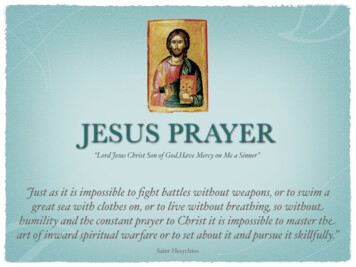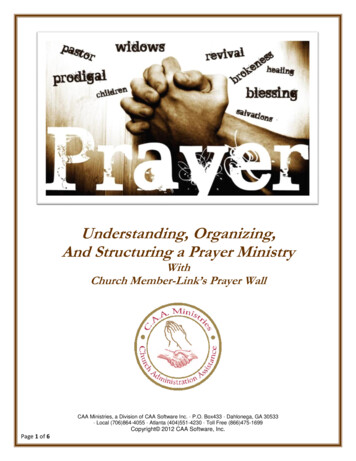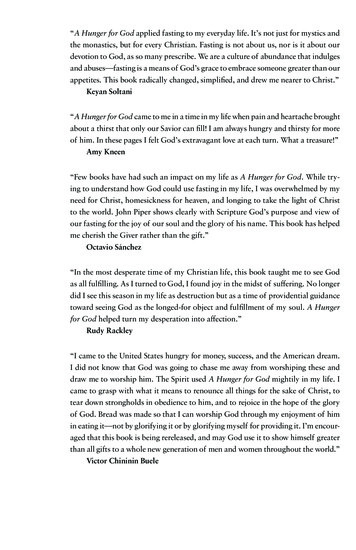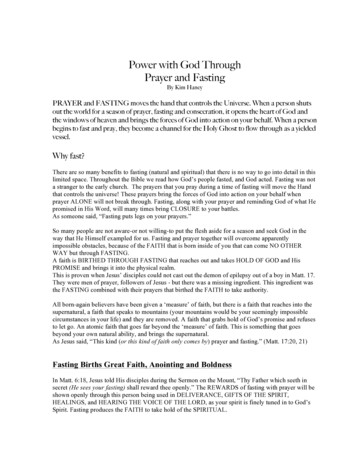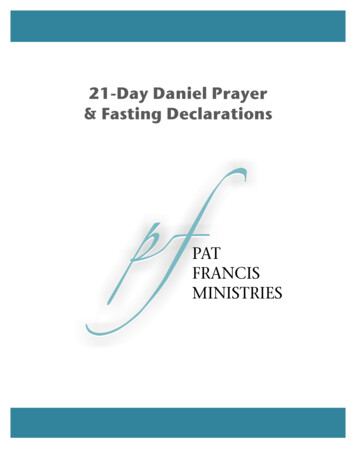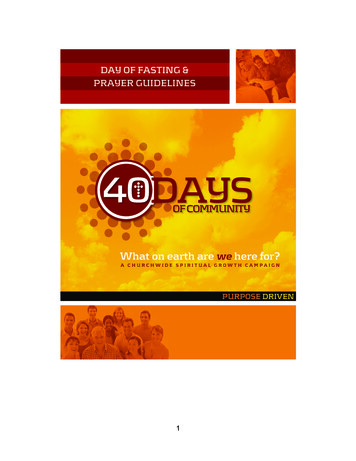
Transcription
1
DAY OF FASTING & PRAYER GUIDELINESFOR INDIVIDUALS OR SMALL GROUPSTABLE OF CONTENTSDay of Fasting and Prayer by Pastor Rick Warren.1-3Your Personal Guide to Fasting and Prayer by By Dr. Bill Bright .5-7The Spiritual Discipline of Fasting by Pastor Lance Witt .9-132
Day of Fasting and PrayerBy Pastor Rick WarrenWHAT IS FASTING?Fasting is a spiritual discipline that is taught in the Bible. Jesus expected hisfollowers to fast, and he said that God rewards fasting. Fasting, according to theBible, means to voluntarily reduce or eliminate your intake of food for a specifictime and purpose.“When you give up eating, don't put on a sad face like thehypocrites. They make their faces look sad to show people theyare giving up eating. I tell you the truth, those hypocrites alreadyhave their full reward. So when you give up eating, comb yourhair and wash your face. Then people will not know that you aregiving up eating, but your Father, whom you cannot see, will seeyou. Your Father sees what is done in secret, and he will rewardyou.”Matthew 6:16-18 (NCV)WHY FAST?There are many good reasons, and even health benefits, for fasting. However,our UNITED DAY OF FASTING for the 40 Days of Community Campaign is forthree primary reasons:1. Fasting gives you more time for prayer. You can use the time you’dnormally spend eating as time in prayer for what God wants to do amongus during this Campaign. In the Bible, fasting is always connected withprayer.“While they were worshiping the Lord and fasting, the Holy Spiritsaid, ‘Set apart for me Barnabas and Saul for the work to whichI have called them.’ So after they had fasted and prayed, theyplaced their hands on them and sent them off.” Acts 13:2-3 (NIV)2. Fasting demonstrates the depth of your desire when praying forsomething. It shows you that you are serious enough about your prayer3
request to pay a personal price. God honors deep desire and praying infaith.“Declare a holy fast; call a sacred assembly. Summon theelders and all who live in the land to the house of the Lord yourGod, and cry out to the Lord.”Joel 1:14 (NIV)“Even now,” declares the Lord, “return to me with all your heart,with fasting and weeping and mourning.”Joel 2:12 (NASB)3. Fasting releases God’s supernatural power. It is a tool we can use when there isopposition to God’s will. Satan would like nothing better than to cause division,discouragement, defeat, depression, and doubt among us. United prayer andfasting has always been used by God to deal a decisive blow to the enemy!“So we fasted and prayed about these concerns. And helistened.”Ezra 8:23 (Msg)“God says, “Is not this the kind of fasting I have chosen: to loosethe chains of injustice and untie the cords of the yoke, to set theoppressed free and break every yoke?”Isaiah 58:6 (NIV)THE IMPORTANCE OF FASTINGOften in the Bible, God’s people fasted immediately before a major victory,miracle, or answer to prayer. It prepared them for a blessing! Moses fasted before he received the Ten Commandments.“Moses was there with the Lord forty days and forty nightswithout eating bread or drinking water. And he wrote on thetablets the words of the covenant--the Ten Commandments.”Exodus 34:28 (NIV) The Israelites fasted before a miraculous victory.“Some men came and told Jehoshaphat, "A vast army is comingagainst you from Edom, from the other side of the Sea. It isalready in Hazazon Tamar" (that is, En Gedi). Alarmed,Jehoshaphat resolved to inquire of the Lord, and he proclaimeda fast for all Judah.”2 Chronicles 20:2-3 (NIV)4
Daniel fasted in order to receive guidance from God.“So I turned to the Lord God and pleaded with him in prayer andpetition, in fasting, and in sackcloth and ashes.” Daniel 9:3 (NIV)“While I was still in prayer, Gabriel, the man I had seen in theearlier vision, came to me in swift flight about the time of theevening sacrifice. He instructed me and said to me, ‘Daniel, Ihave now come to give you insight and understanding.’”Daniel 9:21-22 (NIV) Nehemiah fasted before beginning a major building project.“When I heard these things, I sat down and wept. For somedays I mourned and fasted and prayed before the God ofheaven.”Nehemiah 1:4 (NIV) Jesus fasted during His victory over temptation.“For forty wilderness days and nights he was tested by theDevil. He ate nothing during those days, and when the time wasup he was hungry.”Luke 4:2 (Msg) The first Christians fasted during-decision making times.“While they were worshiping the Lord and fasting, the Holy Spiritsaid, ‘Set apart for me Barnabas and Saul for the work to whichI have called them.’ So after they had fasted and prayed, theyplaced their hands on them and sent them off.” Acts 13:2-3 (NIV)TWO CAUTIONS1. Remember that fasting is not “earning” an answer to prayer. God cannot beblackmailed by human effort. God wants to answer our prayers and He answersout of grace. Fasting simply prepares us for God’s answer.2. Fast only if your health allows it at this time. If you are able only to do a partialfast - do it in faith and God will honor your intentions.Adapted from:5
Your Personal Guide to Fasting & PrayerBy Dr. Bill BrightCampus Crusade for Christ, InternationalURL: http://www.ccci.org/howtofast/Description of Website: This study will explain why you should fast, how to fastsafely, what type of fast is right for you, and much more. This site also containsQuickTime clips of Dr. Bill Bright.MAKING YOUR SPIRITUAL EXPERIENCE THE BEST IT CAN BE:Receiving God's best blessing from a fast requires solid commitment. Arrangingspecial time each day with God is absolutely crucial in attaining intimatecommunion with the Father. You must devote yourself to seeking God's face,even (and especially) during those times in which you feel weak, vulnerable, orirritable. Read his Word and pray during what were mealtimes. Meditate on himwhen you awake in the night. Sing praises to him whenever you please. Focuson your Heavenly Father and make every act one of praise and worship. God willenable you to experience his command to "pray without ceasing" as you seek hispresence.As you enter this time of heightened spiritual devotion, be aware that Satan willdo everything he can to pull you away from your prayer and Bible reading time.When you feel the enemy trying to discourage you, immediately go to God inprayer and ask him to strengthen your resolve in the face of difficulties andtemptations.The enemy makes you a target because he knows that fasting is the mostpowerful of all Christian disciplines and that God may have something veryspecial to show you as you wait upon him and seek his face. Satan does notwant you to grow in your faith, and will do anything from making you hungry andgrumpy to bringing up trouble in your family or at work to stop you. Make prayeryour shield against such attacks.Do not become so caught up in praying for yourself and others that you forgetabout simply reverencing and praising God. True spiritual fasting focuses onGod. Center your total being on Him, your attitudes, actions, motives, desires,and words. This can only take place if God and His Holy Spirit are at the centerof your attention. Confess your sins as the Holy Spirit brings them to yourattention and continue to focus on God and God alone so that your prayers maybe powerful and effective.A renewed closeness with God and a greater sensitivity to spiritual things areusually the results of a fast. Do not be disappointed if you do not have a"mountaintop experience," as some do. Many people who have successfully6
completed extended fasts tell of feeling a nearness to God that they have neverbefore known, but others who have honestly sought his face report no particularoutward results at all. For others, their fast was physically, emotionally, andspiritually grueling, but they knew they had been called by God to fast, and theycompleted the fast unto him as an act of worship. God honored that commitment.Your motive in fasting must be to glorify God, not to have an emotionalexperience, and not to attain personal happiness. When your motives are right,God will honor your seeking heart and bless your time with him in a very specialway.MAINTAINING NUTRITIONAL BALANCE:There are many types of fasts, and the option you choose depends upon yourhealth, the desired length of your fast, and your preference: A Water Fast – means to abstain from all food and juices A Partial Fast – means to eliminate certain foods or specific meals A “Juice” Fast – means to drink only fruit or vegetable juices during meal timesI know the prospect of going without food for an extended period of time may beof concern to some. But there are ways to ensure that your body is getting thenutrients it needs, so you can remain safe and healthy during your fast.If you are beginning a juice fast, there are certain juices you may wish to avoidand certain ones that are especially beneficial. You may find the following dailyschedule helpful during your fast.5:00 a.m. - 8:00 a.m.Fruit juices, preferably freshly squeezed or blended, diluted in 50 percent distilledwater if the fruit is acid. Orange, apple, pear, grapefruit, papaya, grape, peach orother fruits are good.10:30 a.m. - noonVegetable juice made from lettuce, celery, and carrots in three equal parts.2:30 p.m. - 4:00 p.m.Herb tea with a drop of honey. Make sure that it is not black tea or tea with astimulant.6:00 p.m. - 8:30 p.m.Broth from boiled potatoes, celery, and carrots (no salt).I suggest that you do not drink milk because it is a pure food and therefore aviolation of the fast. Any product containing protein or fat, such as milk or soybased drinks, should be avoided. These products will restart the digestion cycleand you will again feel hunger pangs. Also, for health reasons, stay away fromcaffeinated beverages such as coffee, tea, or cola. Because caffeine is astimulant, it has a more powerful effect on your nervous system when youabstain from food. This works both against the physical and spiritual aspects ofthe fast.Another key factor in maintaining optimum health during a fast is to limit yourphysical activity. Exercise only moderately, and rest as much as your schedule7
will permit (this especially applies to extended fasts). Short naps are helpful aswell. Walking a mile or two each day at a moderate pace is acceptable for aperson in good health, and on a juice fast. However, no one on a water fastshould exercise without the supervision of a fasting specialist.HOW TO FINISH YOUR FAST IN A HEALTHY WAY:Most experts agree that breaking a fast with vegetables, either steamed or raw,is best. Your stomach is smaller at this point, so eat lightly. Stop before you feelfull. Stay away from starches like pastas, potatoes, rice, or bread (except for"Melba toast"). Also avoid meats, dairy products, and any fats or oils. Introducethem slowly and in small amounts.Extended fasts are not the only fasts which need to be ended with caution. Evena 3-day fast requires reasonable precautions. It is wise to start with a little soup something thin and nourishing such as vegetable broth made from onion, celery,potatoes, and carrots - and fresh fruits such as watermelon and cantaloupe.In terms of resuming any sort of exercise routine, the advice is the same. Startout slowly, allowing time for your body to re-adjust to its usual regime. 1997 Campus Crusade for Christ. All Rights Reserved8
THE SPIRITUAL DISCIPLINE OF FASTINGPre-Campaign Message for Staff and Campaign TeamBy Pastor Lance Witt, Saddleback ChurchAn Outdated Oddity?When I was a kid growing up in church, I heard hundreds of sermons, satthrough hundreds of small group lessons, and participated in dozens of programsat my church. Throughout all of those years saturated in “church,” I do notremember my pastor one time ever doing a message on fasting. I do not everremember a small group lesson on fasting. I don’t ever remember our churchbeing called to a time of prayer and fasting as we sought God on some importantdecision.By default, I grew up thinking that fasting was something they did in the OldTestament that was sort of like animal sacrifices. We just don’t do it anymore.And I was fine with that. The idea of going extended periods of time withouteating didn’t sound like my idea of fun.An Assumed Practice!But, then we read a passage like Matthew 6:16-18 (NIV):"When you fast, do not look somber as the hypocrites do, for they disfigure theirfaces to show men they are fasting. I tell you the truth, they have received theirreward in full. But when you fast, put oil on your head and wash your face, sothat it will not be obvious to men that you are fasting, but only to your Father, whois unseen; and your Father, who sees what is done in secret, will reward you.”This passage comes right in the middle of Jesus’ teaching on prayer and giving.In this sermon, Jesus uses phrases like: “When you give” (v. 2), “When you pray”(v. 5), and “When you fast” (v. 16). Jesus assumes that his audience will give, willpray, and will fast. Fasting is not an option. It is not an oddity. Fasting, accordingto Jesus, is a given. In fact, fasting is mentioned more times in the Bible thanbaptism! In the Bible, we observe the people of God fasting for a variety of reasons:They were facing a crisisThey were seeking God’s protection and deliveranceThey had been called to repentance and renewalThey were asking God for guidanceThey were humbling themselves in worship9
The Danger in the DisciplineBut there is an inherent danger in fasting. It is the same danger that is found inthe practice of any spiritual discipline. We can turn fasting into an end unto itself,rather than a means to an end. It can become merely an external practicewithout an internal passion. It can be reduced to a habit without heart. We seean example of this in Luke 18:12, where Jesus tells the story of a Pharisee whobragged to God in prayer that he fasted twice a week. Pharisees habituallyfasted twice a week, usually on the 2nd and 5th days of the week. These two dayshappened to be the major days for the Jewish market. That meant the city waspacked with farmers, merchants, and shoppers. Therefore, these days of publicfasting would have the largest audiences. Jesus condemned the practice offasting when it was done in such a way as to receive public adulation.We have an ability to take that which is sacred, holy, and meant to draw uscloser to the Father, and turn it into a merely mechanical, religious drill that weuse to impress others of our spirituality. What was intended to draw us to Godnow actually distances us from God because we have perverted it. And Godnotices. He prompted the prophet Zechariah to ask the people and the priests ofIsrael, “During those seventy years of exile, when you fasted and mourned in thesummer and at the festival in early autumn, was it really for Me that you werefasting?” (Zechariah 7:5 NLT Italics mine)A Time of FeastingWhen John Wesley spoke of fasting,he said “First, let it be done unto theLord with our eye singly fixed on Him.Let our intention herein be this, andthis alone, to glorify our Father whichis in Heaven.”When we decide to set aside time tofast, here is what I think would pleasethe heart of God. Let’s talk about thistime of spiritual discipline not as a dayof fasting, but a day of feasting –feasting on Jesus.There is an orphanage in India wherethe staff and the children all fast everyFriday. And you know what they callit? They call it their day of feasting onJesus. And do you know what they do10
during their day of feasting? They pray for the American church. Now, that ishumbling.A Call to FastJoel 2:12-17 (NLT)That is why the Lord says, "Turn to me now, while there is time! Give me yourhearts. Come with fasting, weeping, and mourning. [13] Don't tear your clothingin your grief; instead, tear your hearts." Return to the Lord your God, for he isgracious and merciful. He is not easily angered. He is filled with kindness and iseager not to punish you. [14] Who knows? Perhaps even yet he will give you areprieve, sending you a blessing instead of this terrible curse. Perhaps he willgive you so much that you will be able to offer grain and wine to the Lord yourGod as before![15] Blow the trumpet in Jerusalem! Announce a time of fasting; call thepeople together for a solemn meeting. [16] Bring everyone—the elders, thechildren, and even the babies. Call the bridegroom from his quarters and thebride from her private room. [17] The priests, who minister in the Lord'spresence, will stand between the people and the altar, weeping. Let them pray,"Spare your people, Lord! They belong to you, so don't let them become anobject of mockery. Don't let their name become a proverb of unbelievingforeigners who say, 'Where is the God of Israel? He must be helpless!' "1. Fasting starts with the spiritual leaders. Joel starts off his urgent call to afast by saying, “Hear this, you elders.” (Joel 1:2)2. Fasting is often associated with a sense of spiritual desperation. Joel2:12 says, “Turn to me now, while there is still time.” Notice the sense of urgencyand desperation.3. Fasting is a call to return to God. (Joel 2:13) Israel’s first need, like that ofthe prodigal son, was just to come home to the Father. God doesn’t talk aboutthe people’s need for better plans, programs, or strategies. He is simply sayingto them: You have been unfaithful to me. Come home.11
4. Fasting is not about the externals. In Joel 2:13, God says, “Don’t tear yourclothing in grief, instead tear your hearts.” It is entirely possible to go without foodand not have a true fast.5. Fasting is the response of a broken heart. Why does Joel say, “Come withweeping, fasting, and mourning”? (2:12) Because repentance is the appropriateresponse when you have strayed. And, God is responsive. “He is gracious andmerciful not easily angered” (2:13). Somehow, God is drawn to the empty,broken, needy, and weak. As Jim Cymbala says, “God is attracted to weakness.”6. Fasting is the humble response to immense responsibility. Joel calls asolemn assembly. In verse 15 he says, “blow the trumpet announce a time offasting” and he urges everyone to get there — the elders, the children, thebabies; he even says to get the bride and groom! Why? Because God’s nameand reputation were at stake (2:17). The people of Israel were being urged toenter a time of fasting, with the direct result that they would preserve God’sreputation and glorify His name. That is an immense responsibility!Plug into God’s PowerI’ll tell you what a sobering thought tome is, as I think about 40 Days ofCommunity. It is the thought that Godhas given us a sacred stewardship. Hehas allowed us to lead something muchlarger than ourselves or our church.With that comes great responsibility,because his name and reputation are onthe line.Let’s not forget that the 40 Days ofCommunity Campaign is not an end initself. It is simply a way of puttingpeople in touch with the life-changingpower of God for their lives. We have aplan called 40 Days of Community, butwe need the power of God in it. And,you don’t program the power of God intosomething, you pray the power of Godinto it.I am excited that we have made prayer a vital part of this year’s campaign, but Ihave a fear. My fear is that we will talk so much about prayer that we are lulledinto thinking that we are actually praying, when we’re really not. Think of it thisway: You walk into someone’s house, and you notice that the door squeaks, the12
paint is peeling, the legs on their chairs are broken, and the windows are crackedand hanging off their hinges. Then you walk into their garage and see that is fullof state-of-the-art tools, all gleaming, fresh out of the boxes. But you can tell fromthe state of the house that these wonderful tools have never been used. Toolsare only good if they are put to use.Likewise, we have this incredibly powerful tool called prayer. But it will do us nogood if we know it’s there, but we keep it in storage, never pulling it out andapplying it to our problems, concerns, relationships, and responsibilities. Prayeris the tool that God has given us to use on all the disrepair in our lives, in ourchurch, in our communities, in our country. I would urge you to use theexperience of fasting to restore your focus and revive the power of prayer in yourlife. Feast on God during this important time.13
By Pastor Rick Warren WHAT IS FASTING? Fasting is a spiritual discipline that is taught in the Bible. Jesus expected his followers to fast, and he said that God rewards fasting. Fasting, according to the Bible, means to voluntarily reduce or elimi

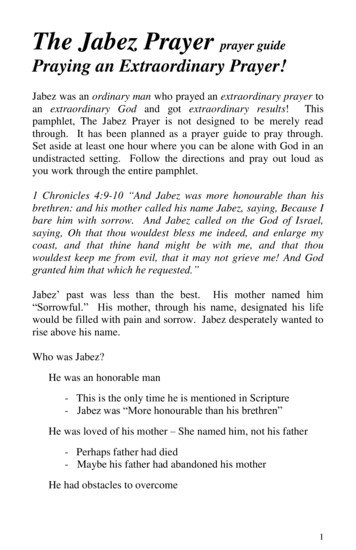
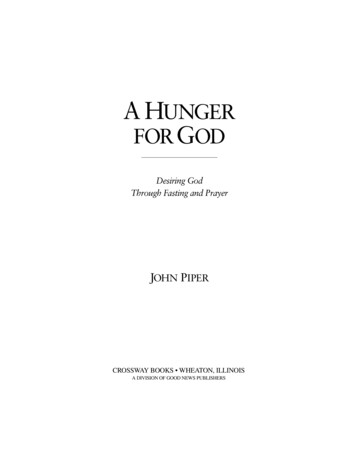
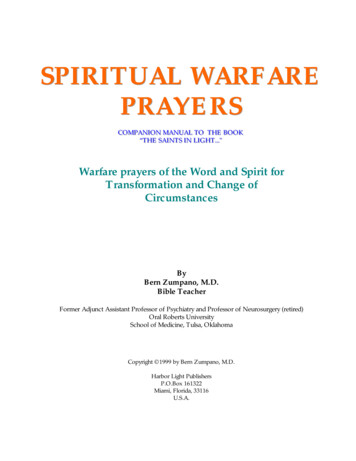
![Welcome [dashdiet.me]](/img/17/30-day-weight-loss-journal.jpg)

